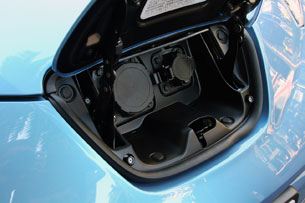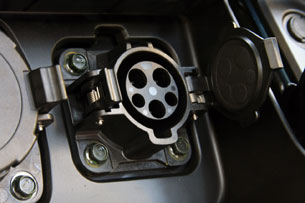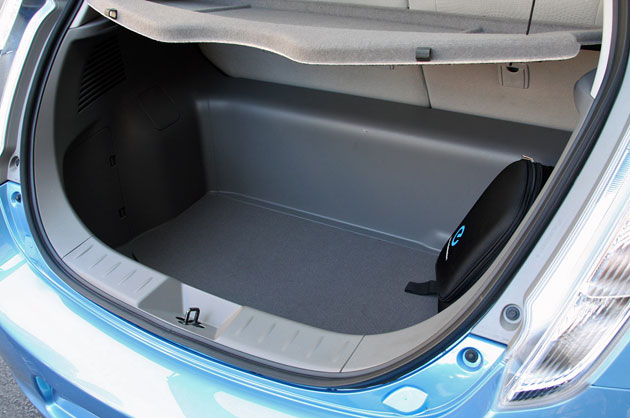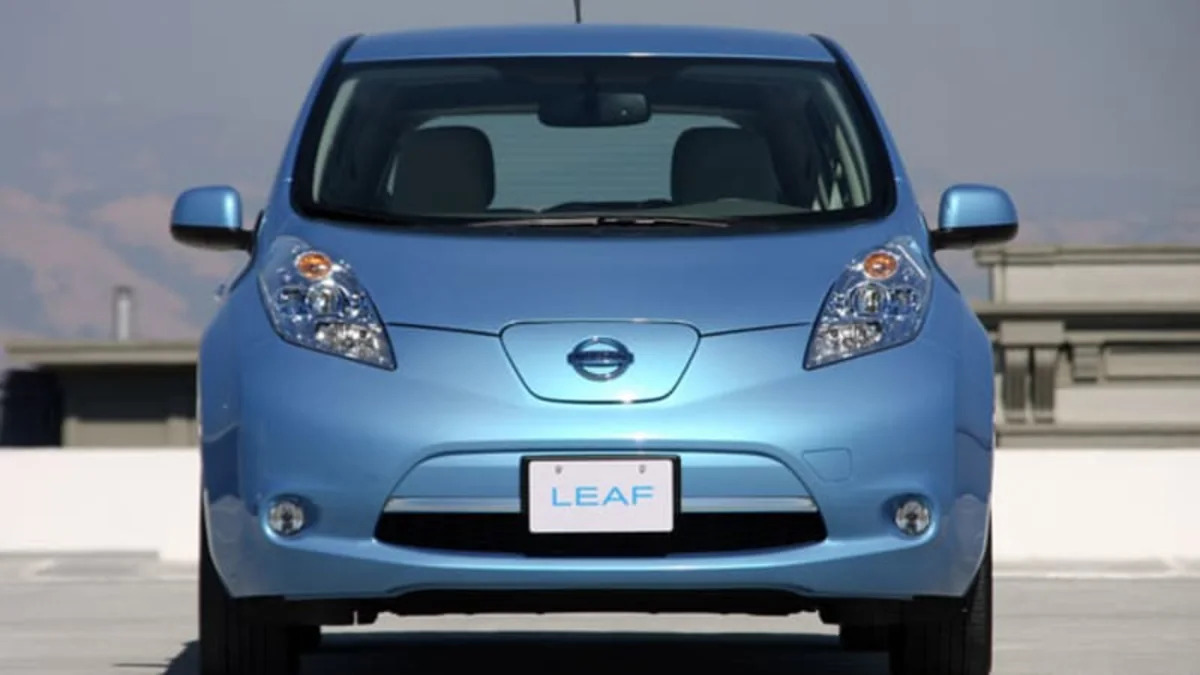Test driving an electric car at an automaker's media event is one thing. Taking one home and living with it is a completely different experience. Nissan just loaned me a Leaf for several days and I came away with a new appreciation for the potential pitfalls and rewards of owning an EV.
First off, I really liked the Leaf. It's a nice, comfortable car with more than adequate power, it's unbelievably quiet and offers a decent driving range. In fact, it's been a long time since I was this excited to bring a test car home. But it wasn't always a shiny, smiley, happy experience.
Let me state unequivocally: if you can only recharge from a 110-volt outlet, the Leaf is not for you. Not if you have a hefty commute and only own one car, that is.
 John McElroy is host of the TV program "Autoline Detroit" and daily web video "Autoline Daily". Every week he brings his unique insights as a Detroit insider to Autoblog readers.
John McElroy is host of the TV program "Autoline Detroit" and daily web video "Autoline Daily". Every week he brings his unique insights as a Detroit insider to Autoblog readers.
The problem is that if you run the battery down, it takes 20 hours to fully recharge the Leaf from a 110-volt outlet. That can force you into what I call a "charging deficit." You simply run out of hours in a day to fully recharge your car. This is especially true if you can't recharge at work. So every day, your possible driving range becomes a little bit shorter, until at some point, you simply have to park the car for nearly a day. With 110 volts, you get about five miles range for every hour of charging.
A 220-volt outlet instantly solves the problem. It cuts the recharging time by more than half. But if you are contemplating buying an EV and only have access to 110-volt outlets, then the Leaf probably shouldn't be on your shopping list. You may want to consider the Chevrolet Volt, which has a smaller battery pack and doesn't need as many hours to recharge.


Every Leaf comes with a 110-volt charger, essentially a thick extension cord with a box full of electronics attached to one end. It comes from the factory nicely and neatly coiled in a carrying case in the luggage compartment. But it's bulky and awkward to use. After the second time using it, I gave up trying to coil it and neatly stow it back in its case. I just opened the hatch and dumped the thing in the back.
One morning, it was raining and so I had to dump a wet charger into the back of the car. I'm sure a lot of people would not be happy doing that. And it would only be worse if the charger were covered in mud or snow or ice. Of course, parking the Leaf in a garage would solve that problem. Anyone contemplating buying an EV will definitely want a garage, and a permanent 220-volt charger. Those chargers cost about $2,000 installed, but at least for now there are generous manufacturer incentives to cover the cost.
The first night I tried charging the Leaf, I didn't get it right. Not one electron ended up in the batteries. So I came out the next morning to find my driving range was down to only 63 miles. Talk about a charging deficit!

The problem was that I didn't plug it in properly. The charging cable has a big, fat plug on the end, and the outlet I used did not let the plug seat properly. It stuck out a little bit, but not enough for me to notice. Nor did I notice that the electronic lights on the charger failed to light up. No one told me to check the lights, so I didn't know to check them.
Yet, I was sure I was doing everything perfectly. When I plugged the charger into the car, it beeped to let me know it was connected. After that, a little pictogram of a plug appeared on the instrument cluster. With this kind of positive feedback, I naturally assumed that everything was charging properly. Wrong!
Later, a quick call to Nissan taught me there are three little blue lights on the top of the instrument panel (viewable from outside of the car) that let you know if the Leaf is charging. If they're not on, nothing's going into the batteries. Again, I didn't know that. Stupid of me not to know, right? Of course. But I'll bet I'm not the only one who has this happen.
Another disappointment was that I was unable to set the automatic timer for the heater to come on. One of the attractive aspects of EVs is that you can set the temperature to your liking before you get in the car, while it's still plugged in. That way the batteries don't have to take a big hit to heat or cool it. So I set the temperature at 74 degrees F and set the timer for 7 AM. But the next morning, it was cold outside, and the car was just as frigid. What went wrong? It turns out that when the Leaf is charging, it will not let the heater or air-conditioning come on. All the juice is diverted to the batteries. Nissan tells me there is a way to set the car to charge to only 80% or lower. And once the batteries hit that level, then the automatic temp will come on. But no one ever told me that.
And you definitely want to heat or cool the car while it's plugged in. That's because your driving range drops by at least 10 miles the instant you turn on the heater. Of course, the range goes up if you turn the heater off. So I found myself turning on the heat long enough to warm up my toes, then switching it off. I was able to extend my driving range somewhat, but my toes never got very warm.
A word about the heater. It works reasonably well, but not all that great. In my experience it seemed to take longer to warm up than a conventional car, and never got as hot. Nissan will have heated seats and a heated steering wheel as part of a cold weather package, but they're not available yet. Heated seats are a more efficient way to get warm and shouldn't affect your driving range as much.
Despite all the setbacks, I loved living with the Leaf. There was always something new to learn. One of the coolest displays on the instrument panel is a readout of your electrical consumption. It displays the energy consumption of the powertrain, the climate controls and the accessories. I found myself constantly playing around with this. It was amazing to see how little electricity the radio uses, and just as intriguing to see how the electrical load increased going from low-beams to high-beams.
Maybe you don't care about that. EVs are definitely not for everyone. But they will satisfy most people who are willing to deal with their limitations. I'm just reporting all this in the hopes that other EV enthusiasts will avoid the problems I ran into.
Autoline Detroit airs every Sunday at 10:30AM on Detroit Public Television.


Sign in to post
Please sign in to leave a comment.
Continue